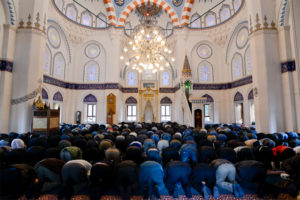by WorldTribune Staff, June 30, 2016
Japan’s Supreme Court has cleared the way for the government’s continued monitoring of Muslims in the country.
In upholding the government’s blanket surveillance of Muslims, the court struck down the second appeal by Japanese Muslim plaintiffs against what they said was an unconstitutional invasion of their privacy and freedom of religion.

A leak of police files in 2010 revealed nationwide monitoring of Japanese Muslims at places of worship, halal restaurants and Islam-related organizations in Tokyo.
A group of 17 Japanese Muslims, mostly from Middle Eastern and North African countries, sued the Japanese government over the policy.
One of the plaintiffs, Mohamed Fujita, a native of Japan, told Al Jazeera that “they made us terrorist suspects, we never did anything wrong – on the contrary.”
The Supreme Court finally dismissed the case after two appeals on 31 May, but the plaintiffs were awarded 90 million yen ($880,000) as compensation due to violation of their privacy by the leak.
The presiding judges in the case, however, did not make a judgment on police profiling and surveillance tactics which a lower court had upheld as “necessary and inevitable” to guard against international terrorism.
Speaking at a Tokyo symposium on government surveillance via weblink, NSA Whistleblower Edward Snowden said: “People of the Islamic faith are more likely to be targeted… despite not having any criminal activities or associations or anything like that in their background, simply because people are afraid.”
